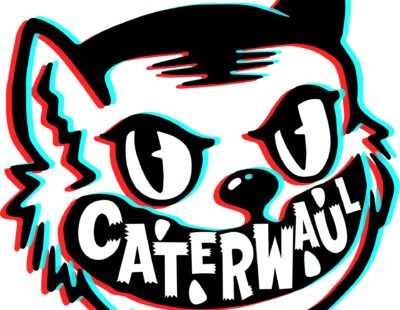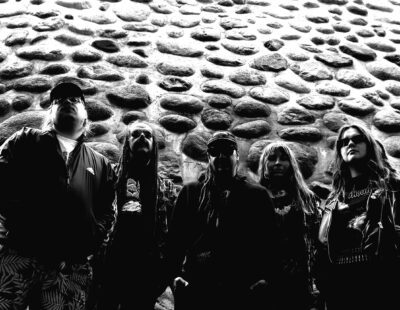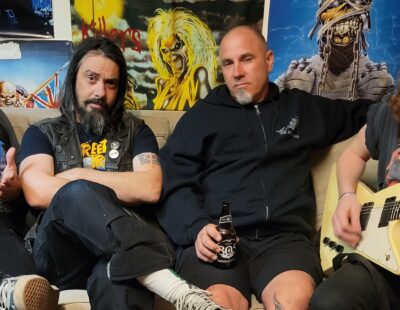
The East Bay has long been a hub for some of the country’s best metal. Three years ago, we gave you a close up of the scene’s history in our feature Metal Mecca (still available in issue #102) . The story discussed just how Metallica, Neurosis and Exodus got their start in this musically rich part of California. Metal has continued to flourish here decades later. Earlier this year we caught up on the East Bay and Oakland scene with the members of Infinite Waste, who put out a killer sampler of regional music to distribute at last year’s California Deathfest.
Now we’re taking another close look at the scene — this time at a survivor intent on mining a difficult past to get at musical truth. The Bay Area is no longer hospitable to the underground creative culture; in many ways, the rapidly gentrifying region is hostile to it. That didn’t deter Tristin Campbell, who sold his belongings and moved into a box truck with his bandmates to pursue music with his band Control.
In a time where established bands ask for handouts via online fundraisers Campbell is a throwback to the do-it-yourself ethos that made this region so rich musically. He told us about making the new album The Teeth & The Wounds (produced by Decibel favorite Kurt Ballou at GodCity Studio, with studio bass by former Decapitated bassist Martin Rygiel) and working through a difficult past while living an austere life. The album (streaming below) is a testament to survival and resilience that you should check out immediately. Control is looking for a permanent bassist now and plans to tour in the near future.
How did Control come together?
Music has always been my only way to connect to the world outside me. My history of abuse and trauma goes back before my earliest memories. I’ve always been in pain and consumed by a need to destroy. I wanted something to come of my life besides suffering and destruction so I started Control to take control of my need to destroy. Meeting Jesse (Bellino, drums) and Dana (Barbieto, live sound) was just simple luck.
Can you tell us more about writing The Teeth & The Wounds?
Writing TT&TW was the fruit of my life experiences and our relationships. Writing music that comes from a truly cold and vicious place takes a lot of trust for someone who knows the cold too well. It’s hard to show how cold you’ve grown when you want someone to stick around. Acid trips were an integral part of the album process. Both in being a medium to reach across to each other on deeper levels, and for me to feel. To be able to record all the instruments in single takes without edits took a lot of rehearsal. Nearly a year holed up in our rehearsal studio playing five to six days a week, up to 10 hours a day.
“All I cared about was playing, so our apartment quickly became a place to shower and eat in between our days at the rehearsal studio. It seemed to me a large waste of our resources and time. So we moved out, gave away our possessions and moved into a box truck.”
Did you consider working with a label on the release?
Labels are where business become a real part of the picture. No label is going to back you unless there’s a big enough piece of the pie for them to eat off, too. Before this album, I knew we did not have enough to offer to justify label backing. So we never thought about that and just focused on the music. If someone digs us and wants to work with us, they will find us.
How did you end up working with Kurt Ballou?
When we were trying to decide who to work with, we just listened to as many recent recordings we could. Whenever we heard one that we liked the sound of, we’d looked up who recorded it and it always happened to be Kurt. His work on Torche’s Harmonicraft really impressed us. So we sent him a demo, he thought it sounded “killer,” and that was that.
How did you end up living in a box truck together?
Everyone has a bottom line that they have to work with. Safety from death, injury and starvation are the most primal and deepest bottom line. The bottom line for people is generally far above that and encompasses a large amount of comfort and convenience: privacy and personal space, entertainment, etc. This is why a pigeon can brave the elements and go to sleep at night comfortably while people need more than any other animal could imagine to even feel comfortable enough to go to sleep. My bottom line floats somewhere above the true bottom line and far below the norm. It’s the way I grew up. Control, in reality, is very much me. By “me,” I mean that feeling that moves me to destroy. I think there is a line somewhere between who I am and that feeling, but I don’t know where. It is my whole world in a sense.
When we became Control, it was natural for me that we live together. That feeling being my whole world was all I knew, so I made my world theirs. We tried sharing an apartment together, but I became unsatisfied. All I cared about was playing, so our apartment quickly became a place to shower and eat in between our days at the rehearsal studio. It seemed to me a large waste of our resources and time. So we moved out, gave away our possessions and moved into a box truck.
We’ve been sleeping in the back of the box truck and pissing in a bucket, which we imaginatively named “the piss bucket.” Bands are expensive, so living out of a box truck in a parking lot immediately offers a financial incentive over an apartment, but that wasn’t all I wanted. I wanted us to be our own tribe, to eat, sleep, shower and exist continually with the people I involved in Control. It’s a mix of my low bottom line, lack of trust in people and high standards, which stems from living with a survival mindset. A sense that everything is on the line. It’s not just a matter of fun for me, I need it. I don’t need privacy, a bathroom, and a bed. I need to destroy. I will destroy and I will destroy as hard as I can. The box truck is a means to an end. We chose to give up many of the things people demand to bring us closer to the music. Dana and Jesse made real sacrifices, yet, I cannot say the same. I am very grateful for them.
Every day that we held onto Control and pushed through the adversity, our trust and insight into each other deepened. We were regularly faced with conflicts that anyone else would have stepped away from to maintain their comfort and emotional peace. It became impossible to solely feel our own emotional experience as we continually lived each other’s lives. Through all of it, we refused to let go of each other. Every time we pushed past our contempt, disgust, anger and irritation with each other, our bonds strengthened. We became so intimate that it became isolating. Interacting with people outside of our tribe became strange. Suddenly we were faced with people who we weren’t deeply entangled with, who we couldn’t be deeply honest with. Small talk, surface insecurities, distrust. We all often wanted fresh faces, but continually found ourselves missing each other.
What do you make of the East Bay metal scene and Oakland in particular?
I love Oakland. Everything feels real here. The people are real, for better or worse, and I appreciate that. The bay tends to be rife in disconnection with the wild disparities it exhibits; but in Oakland I can feel everyone’s love, anger and suffering. Even when it is pointed at me, I appreciate that it is being expressed. Oakland is spilling over with musical acts and some of them are pretty rad. Acephalix, Deathgrave and Infinite Waste are well worth checking out.
What have you learned living in a box truck?
Living out of the box truck together has forced me to face feelings. Out of my cold and mechanical plans to hammer the shit out of the player side of music, I found its heart. It’s a heart scarred by trauma, abuse, and neglect, and that heart belongs to a lot of people out there. Our music won’t hit the spot for all of them. That’s cool, I get it. But some will. Some are going to be rewinding to hear that line again that makes them cry the tears that won’t surface on their own. Someone is going to turn to our music to feed that fire inside of them instead of taking it out on another living being or themselves. Some kid is going to hole up in a bathroom with an MP3 player and find out that someone else suffered and survived.







